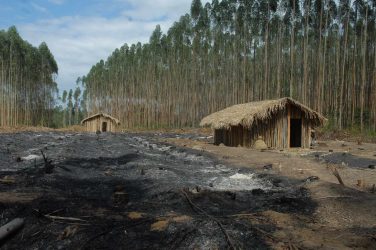In western Brazil’s Amazon, the people tasked with looking after the world’s greatest rainforest are themselves wondering if they have a future.
“We are just trying to survive,” said 24-year-old Cleyton de Oliveira.
Oliveira lives in one of the special areas called extractive reserves that were pioneered in the 1980s by environmentalist and union leader Francisco “Chico” Mendes as a way of putting small producers in charge of the Amazon forest.
The idea was to allow modest communities to farm in a sustainable manner. That way, the underprivileged had an opportunity to make a living and to own land, while their presence would keep the large ranches and plantations from encroaching on the Amazon.
Mendes was murdered by a rancher in 1988 but not before his groundbreaking idea, part of a legacy that made him a national hero, had taken root.
Three decades later, there are 90 such reserves across Brazil, covering 96,500 square miles (250,000 square kilometers), including two created in 2008 in the western state of Amazonas, called Ituxi and Médio Purus – huge territories home to just 6,600 people in total.
They are the descendants of workers employed in slavery-like conditions, as rubber tappers in the 20th century, before extractive reserves gave them a chance to build new, freer futures.
“We had to fight for years to get them, getting a lot of threats,” said Silverio Barros Maciel, an Ituxi reserve community leader.
But today, with almost no government support and ever growing pressure from ranchers who want their lands, the forest farmers say that clock is turning back.
In the two Amazonas reserves, farmers harvest Brazil nuts, açaí, fish and other produce on a modest scale. The creation of the reserves “meant freedom,” says Médio Purus leader, José Maria de Oliveira.
It also meant another line of defense for the Amazon rainforest, putting locals in charge of making sure that exploitation of the natural resources is sustainable and preventing big companies from grabbing land.
Oliveira credits the creation of the two reserves for saving species like the arapaima, a mammoth fish – one of the largest river fish in the world – from annihilation.
But the forces pressing down on the rainforest are ever stronger. The highest deforestation rates in Brazil are found in the area of Labrea, the regional center which governs both reserves and is a hub for logging and ranching.
“There’s a whole mosaic of conservation areas here but that’s not enough to halt the deforestation because there are people who want it to go ahead,” Oliveira said.
At the government environmental body named after the slain campaigner – the ICMBio or Chico Mendes Conservation and Biodiversity Institute – officials feel powerless.
There are only four employees to monitor conservation in an area that is about one-and-a-half times the size of Puerto Rico.
“We are struggling to keep the forest going but we see that conservation of the Amazon is not the government’s priority,” Joedson Quintino, the ICMBio representative for Ituxi said.
Simply living on the extractive reserves is tough. Farmers say the government’s neglect of their communities makes it tougher.
There are no roads, so everything and everybody must travel by river.
To get from Labrea to Ituxi it takes six hours in a fast boat, costing up to US$ 140 worth of fuel both ways. In winter months, when the heavy rains come, boats can take shortcuts to reduce the journey by half.
Scarce educational facilities make raising a family difficult. In Ituxi, for example, there is only basic schooling and the teacher, Francisco da Silva, lives in the small wooden building.
He used ingenuity to build a solar system network which powers a television, a printer and a music player to use for classes. While others rely on noisy, expensive-to-run generators.
“Life on the riverbanks is hard,” says Sicleudo Batista, another rural teacher, who at 29, has already contracted malaria six times.
In Médio Purus, there are about a dozen buildings for middle school, with satellite links for distance learning. But, there’s no access to higher education, which makes it hard to persuade young people not to leave the reserve.
There are a dozen primary school facilities with just a handful of rooms, including teacher accommodations.
teleSUR














